Your podcast discovery platform
Curious minds select the most fascinating podcasts from around the world. Discover hand-piqd audio recommendations on your favorite topics.

piqer for: Global finds Technology and society
Prague-based media development worker from Poland with a journalistic background. Previously worked on digital issues in Brussels. Piqs about digital issues, digital rights, data protection, new trends in journalism and anything else that grabs my attention.
How A.I. Could Turn The Entire Universe Into Paperclips
Are you familiar with the parable of the paperclip maximizer? If not, you should read this short but thought-provoking article by Quartz' Simone Stolzoff, who brilliantly explains this simple yet instructive thought experiment. Introduced by Swedish philosopher Nick Bostrom in 2003, the paperclip maximizer describes how an advanced artificial intelligence with a sole task of manufacturing as many paperclips as possible could hypothetically destroy humanity and ultimately the entire universe.
Although this doomsday scenario greatly illustrates the risk that even seemingly harmless artificial intelligence may pose to human beings, it's not that we should cease experimenting with optimization altogether, emphasises Stolzoff. To avoid the potential catastrophe, we should ensure that future machines are programmed around human values and with a rigorous code of ethics set in place. But most importantly, according to the author, we need proper regulation and a clear system of checks and balances.
"The fear of misuse should not trump the potential improvements these technologies can bring. (...) The key to these experiments is supervision. The Paper Clip Maximizer shows us that intentions won’t matter unless we’ve set up systems to hold ourselves accountable. But when the proper checks are in place, algorithms are nothing to fear — and neither are office supplies," writes Quartz' Simone Stolzoff.
